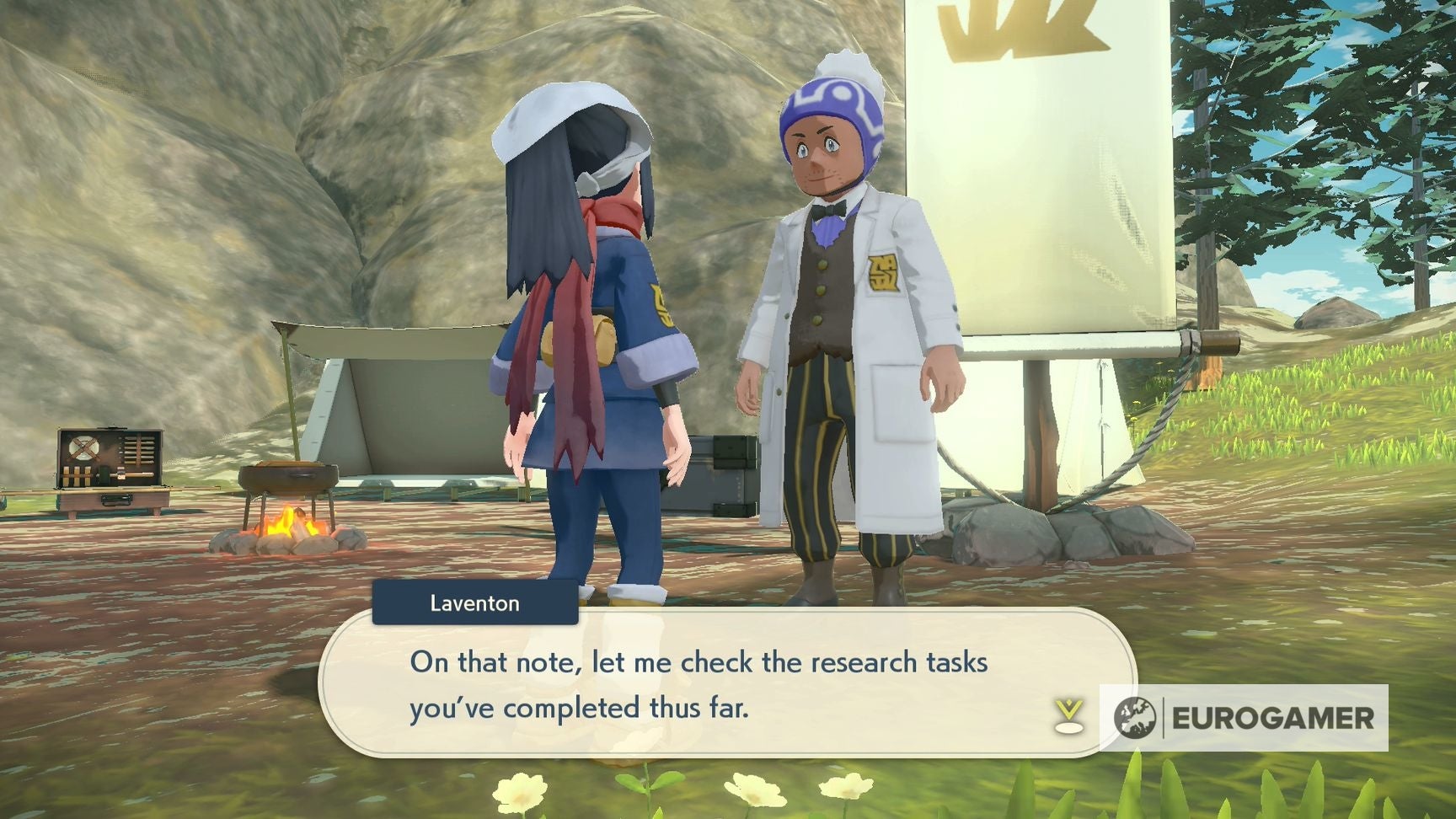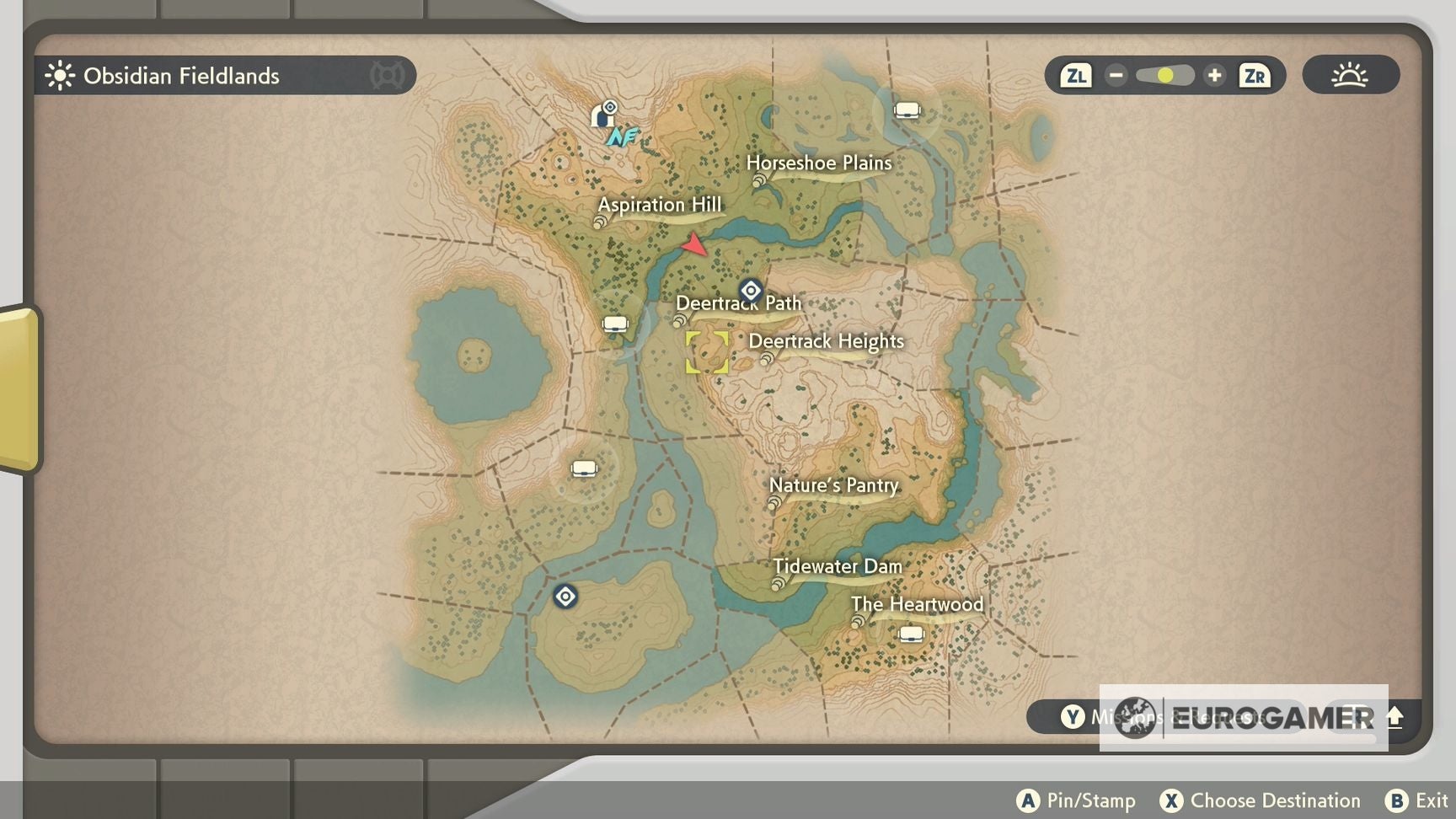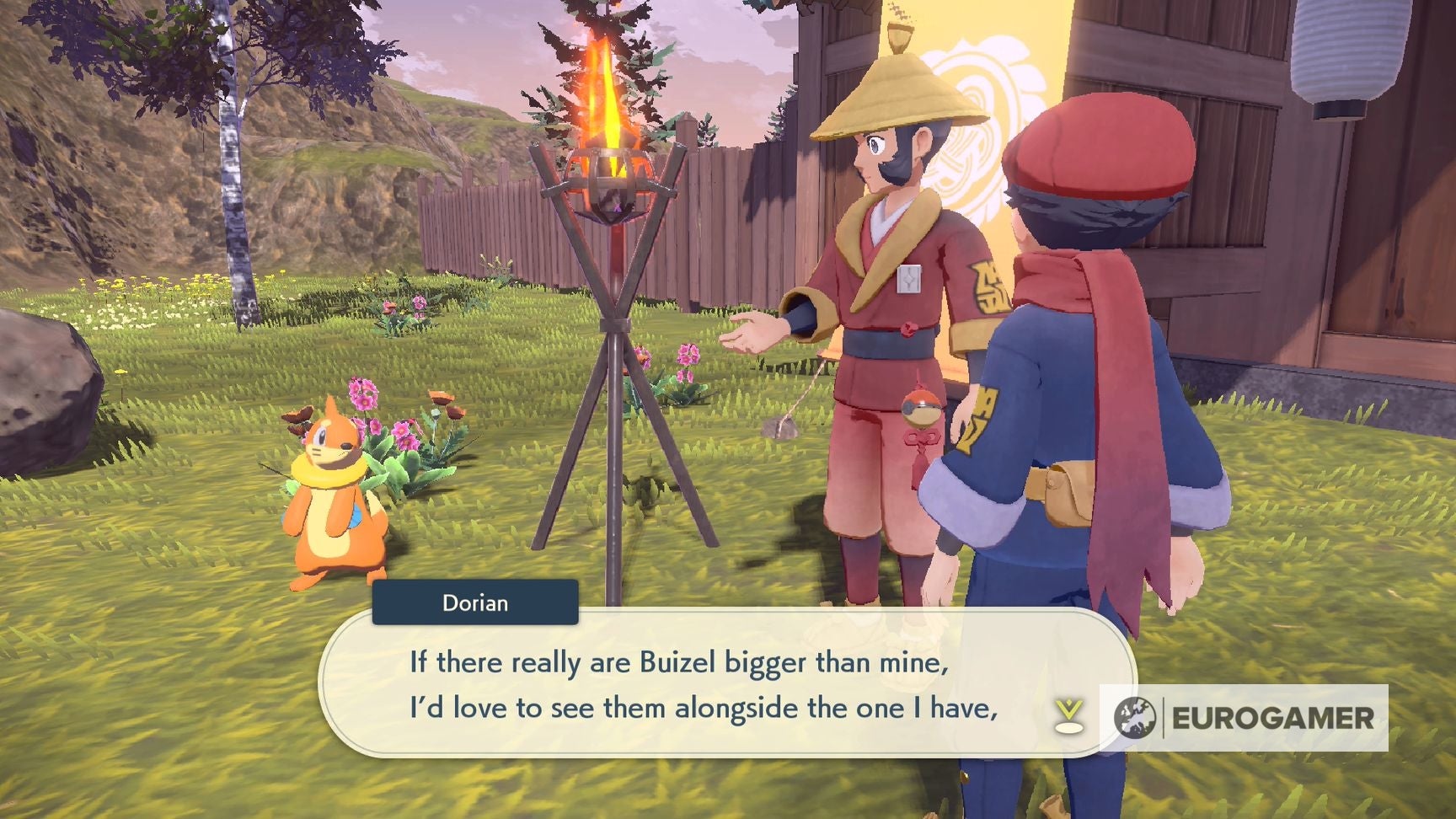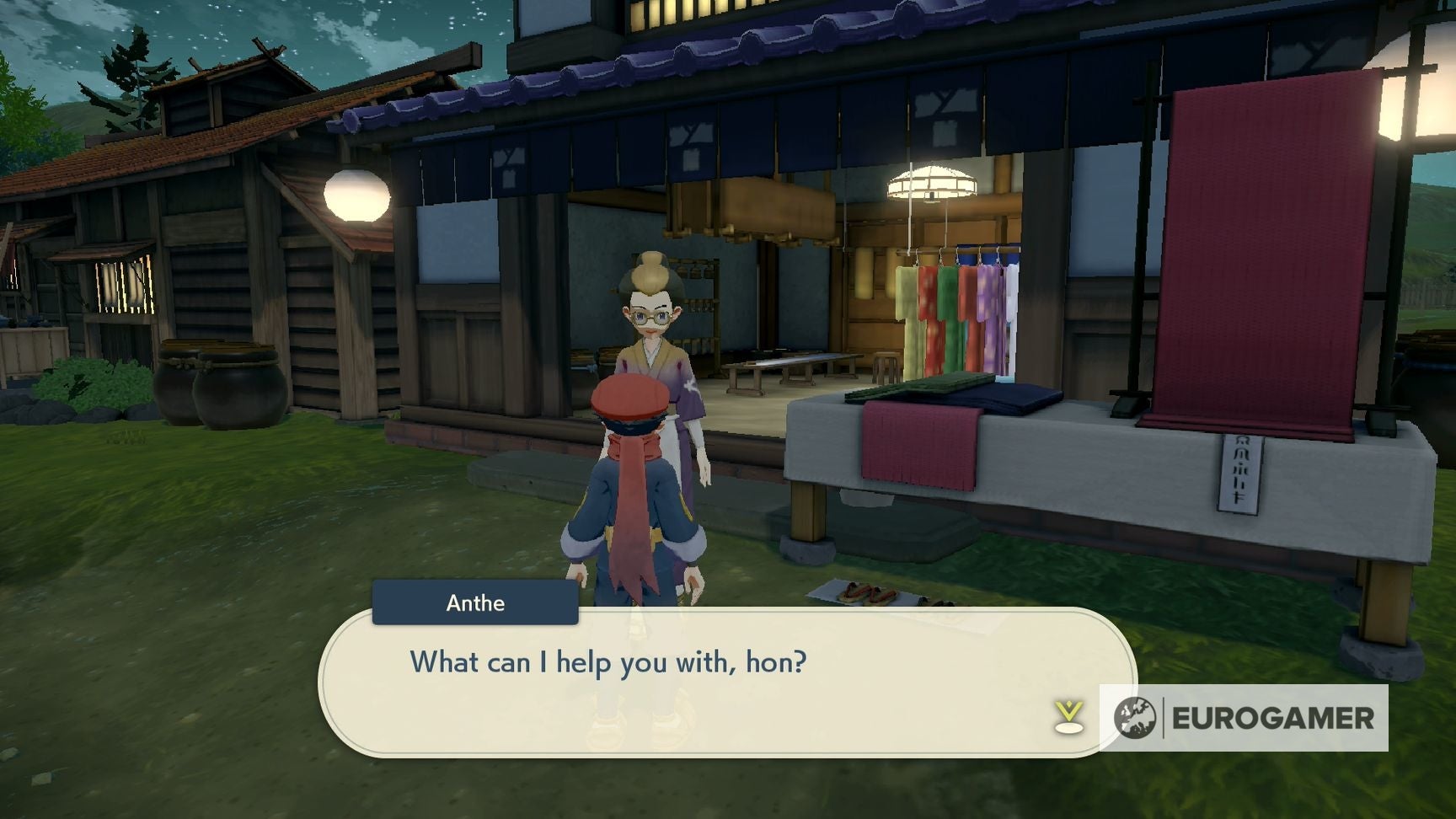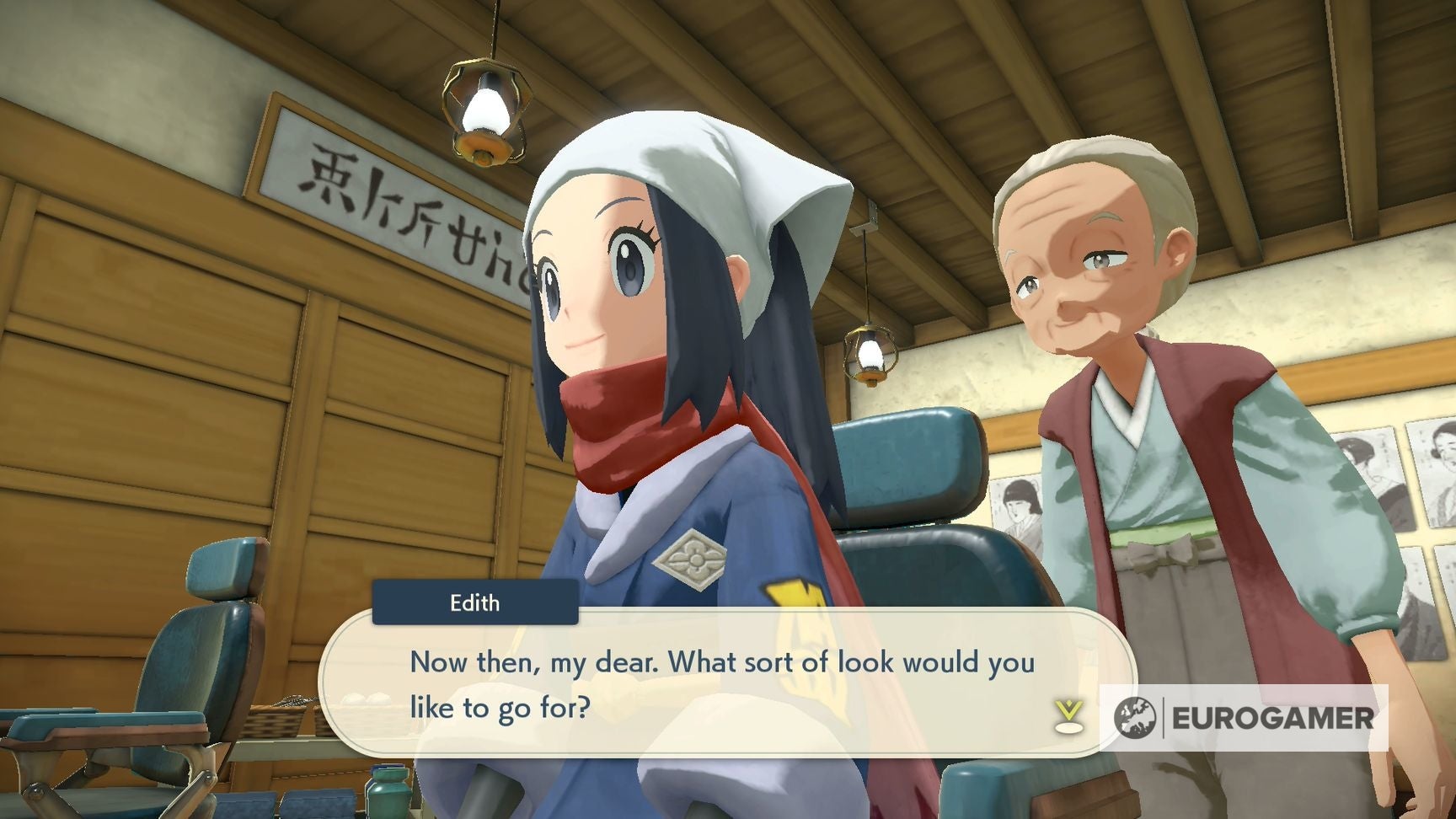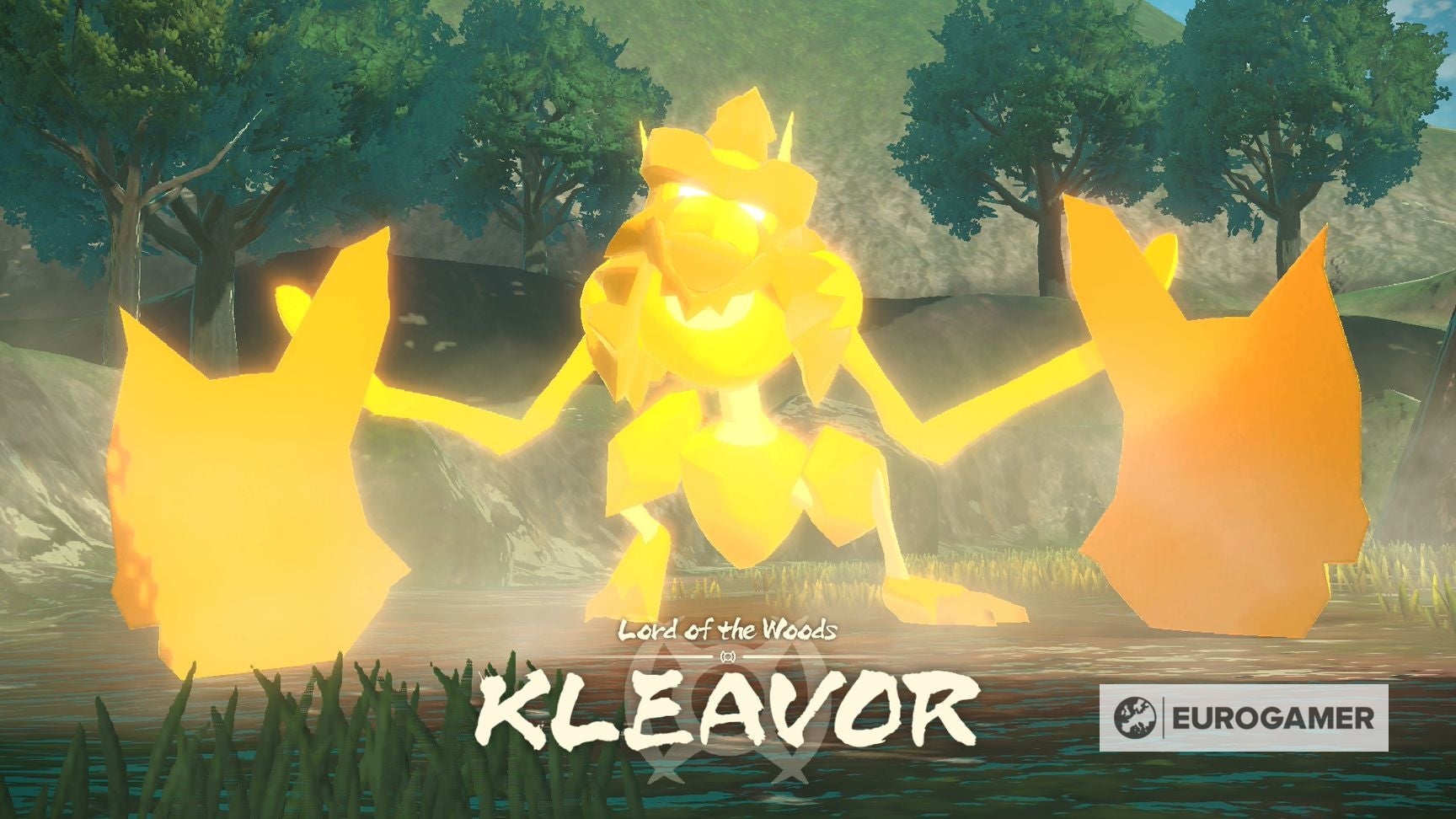We have, finally, been treated to an advanced look at the latest overview trailer, however, and that gives us just a little bit more of an idea as to what this game is really all about. It’s still a hands-off preview, though, still just the same trailer that’s been released to the public today, and there were no opportunities to ask any proper questions to follow up, which means we can’t really give you our own critical impressions of how it’s shaping up. What we can do, however, is explain it all. So let’s dive in: what, exactly, is Pokémon Legends Arceus? By the looks of things, Legends Arceus is a cross between a traditional, main series Pokémon game and Monster Hunter. The setup is you are a new recruit for the Galaxy Expedition Team, an organisation that’s just arrived in the region of Hisui, an ancient version of the generation four area that’s presently known as Sinnoh. You join Galaxy’s Survey Corps, one of a few groups within the team (there’s also a Medical Corps and Security Corps, for instance), and your job as a Survey Corps member is to conduct research on the wild Pokémon of Hisui, gradually assembling the region’s first ever Pokédex. This is the first of many departures from the usual main series games. In light of you building, rather than filling, the Pokédex, catching a single Pokémon of a given species doesn’t completely fill out its Pokédex page. Instead, it’ll add a bit of info to the page - a literally, hand-written page - and you’ll need to fill out research tasks (in a nod to Pokémon Go) for the local professor to uncover more. These tasks include things like catching different numbers of the Pokémon, feeding it different kinds of food, observing it use certain moves in battle a certain number of times, or watch it displaying other “certain behaviours”. This seemingly increases that Pokémon’s research level in the Pokédex, until its page is fully completed. It also appears to be what you need to do to increase your rank within the Survey Corps itself, as doing so grants you something called Research Points. When you’ve accumulated enough, you’ll gain a star which indicates your rank has increased (in this trailer you have no stars, but in another, Japanese-language trailer released a few days ago, you can see a protagonist with more than one). What that rank actually means, or allows you to do, isn’t clear just yet. If we’re speculating, unlocking the new areas of Hisui may be related to that. There’s no word on exactly how you’ll progress through different parts of the world, but from the trailer, you’ll see there are a handful of large, biome-like areas within the region, and then within those many more sub-areas. The Obsidian Fieldlands, for instance, is the grassy, woods-and-meadows biome featured in much of the gameplay footage we’ve been shown so far, and features about 25 sub-areas by the looks of the in-game map. Exploration seems to be a key part of things, but seemingly in a more stripped-back, manual way than similar games like it. There’s a mention of Jubilife Village being the only town in the game and, in keeping with the manual, hand-crafted theme of the period, you’ll need to manually place waypoints onto the map to remind yourself of things you’ve discovered or heard about. Markers indicating special Pokémon, objectives, and trees, were some that we noticed, and there’s also mention of a function that tracks your movement around the world. It’s all very Sheikah Slate, if you’ve played that little-known game called Breath of the Wild. Only in Legends Arceus it’s called an Arc Phone, which is surely a nod to the titular mythical Pokémon - albeit a curiously anachronistic one. As we already know by now, there are several rideable Pokémon - the new Pokémon Basculegion for water, Weirdeer for riding around quickly on the ground (and seemingly getting to some hard-to-reach spots on mountainsides), and the Hisuian Braviary form for “soaring” across the overworld. (Soaring being the Pokémon term for manually flying around in the sky, like in the Omega Ruby and Alpha Sapphire post-game, as opposed to the fast-travel system that these games usually mean when they say “flying”.) These are special one-off Pokémon that have received “blessings” of some kind, enabling them to use these abilities. There’s no mention of any more so far, but acquiring access to them could be an alternative way that your progress through the world is gated - main series Pokémon games have always had a whiff of Metroidvania to them, after all. Alternatively, we know things are definitely progressed in some way via completing Missions. These are the objectives that progress the main story as you complete them, and a handful were very briefly on screen during the trailer. The other type of objective you’ll get are Requests, which come from various individuals and seem to usually be based around catching standard wild Pokémon - examples given are for discovering a specific Pokémon, finding items, defeating certain Pokémon in battle, catching a number of one specific species, or just one to give or show to a person, like the Shinx in the trailer. The other key thing for the overworld is the addition of “raw materials”, which are used for a new crafting system. They include returning items like berries and apricorns, and some new ones, like Tumblestone. It sounds like there are a few new ways to get them, too: you can lob a ball containing one of your party at a stack of weird-looking crystals, and your Pokémon will pop out and give it a whack, collecting the resources that come from it. Similarly you can knock items out of trees with your Pokémon, and also pick them up from patches of grass, and they’re dropped by wild Pokémon you defeat or catch, too. Once you’ve fleshed out your Pokédex page for a Pokémon it’ll show what items they typically carry in the wild. A couple of recipes we noted: a Poké Ball requires an Apricorn and a Tumblestone to make, while a Potion requires an Oran Berry and a Medicinal Leek. Speaking of Poké Balls, catching works quite differently in Legends Arceus to any other Pokémon game before it. It’s a seamless transition from roaming around the world, to finding a Pokémon, to trying to catch it, but there are some crucial mechanics to bear in mind. You can sneak up on Pokémon before throwing a ball, and if you land a “back strike” - literally hitting them on the back with a manually thrown ball - that’ll seemingly give you a better chance of a successful catch. You can also throw bait, such as berries or other items, which Pokémon will eat, making them much easier to sneak up on. Interestingly, we noticed objective notifications popping up in the top-left for feeding a specific Pokémon and catching it a certain number of times, which are apparently a part of the research process. The wild Pokémon themselves have a few different temperaments, however: Bidoof will ignore you, for instance, letting you walk right up to it; Starly will be skittish and run away when you’re spotted; and Shinx is aggressive, attacking you on sight. Pokémon that attack you then enter a kind of alert state, whereby any balls thrown at them will simply bounce off. You’ll need to engage them in battle with your own Pokémon first, and after which you can seemingly throw a ball at any point during that battle as it plays out - although again weakening them, without knocking them out, seems like the best option. You’ll also need to watch out for being attacked yourself, in a major departure from any previous game. Any Pokémon with the aggressive temperament will attack you on sight and can knock you out, at which point you’ll lose a few items and return back to base. Some can do this very easily, especially the new Alpha Pokémon. These are much larger, stronger versions of Pokémon with glowing red eyes - an example in the video was a giant Walrein, while others shown recently include Snorlax, Electivire, Garchomp, and plenty more. This Walrein’s attack knocked out the protagonist’s Raichu in one hit and damaged the protagonist themselves at the same time, so even mid-battle you don’t seem to be safe. According to the narration, these Alpha Pokémon will make for “very strong” allies if you manage to catch them, although it’s not clear whether that’s because of higher stats they might have, stronger moves, or something else. Battling is yet another central part of the game to get a revamp. It looks like the vast majority of battles you’ll be having will be against wild Pokémon, while there is a very brief mention of battling other trainers on the game’s official site - but interestingly, no mention of battling other human trainers in multiplayer (you can trade Pokémon with them though, via the Trading Post in Jubilife Village). The truly big change, though, is to the battling system itself. It’s still turn-based, but that turn order can be manipulated by you - or your opponent - switching “battle styles” during the fight, and the order is displayed Final Fantasy-style in the stop-right. Most, or possibly all, moves can be used in Agile Style or Strong Style. Agile boosts your speed at the expense of damage, meaning you’re likely to get a second move straight after this one; Strong does the opposite, slowing you down but allowing you to do more damage in one hit. In the video the trainer uses Agile Style for one move, gaining a second one to use straight after, for which they switch to Strong Style for big damage, which seems like a useful combo to bear in mind (assuming the extra damage of the Strong attack isn’t cancelled out by the weaker damage of the Agile one). Last but not least, you’ll see yet another playthrough of the battle with the Frenzied Noble Kleavor towards the end of the trailer. If you’re unfamiliar, there are a handful of Noble Pokémon around Hisui, but something’s caused them to become frenzied, meaning they’ll aggressively attack you on sight. These are essentially boss battles, reminiscent of the Totem Pokémon of Sun and Moon, albeit in much more elaborate live action, and your job at first is to dodge-roll your way out of the path of their fairly well-telegraphed attacks, periodically firing back with “balms” you’ve made from their favourite foods - presumably after doing some research to find out what those favoured foods are, first. You’ll lob dozens of these little catnip feed bags at them until they lower their guard for a bit, at which point you battle them with your Pokémon until you clear their temporary health bar. They’ll get stunned, you lob a load more balms at them, and then you repeat the process a few times. It’s an exciting thing in principle, dodging powerful wild Pokémon attacks as a relatively fragile trainer, although hopefully it’ll feel slightly more varied in actual practice than it looks in the video. Crucially, we also heard the protagonist let out a grunt when hit, which is officially the first time a main series Pokémon protagonist has made an actual noise (!). Put everything together and Arceus does sound like a little bit of a revelation for long-time players. Monster Hunter’s structure, Breath of the Wild’s twinkly piano keys and sparse, grassy, third-person hang-gliding, and the unmatched charm of Pokémon themselves is quite the pitch. Even, whisper it, the actual appearance of the game itself has something going for it, as there’s a whiff of watercolour expressionism in there that suits the limited technical scope of these games a little better than some of the more plasticky recent entries from Game Freak and co. At times it can seem quite pretty. Not to get too ahead of myself - we’re a fortnight from release and nobody’s played it yet, after all - but dare I say: I am, actually, really quite excited?
